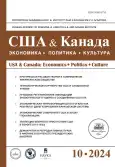2024 US Presidential Election: Reproductive Rights in Focus
- Autores: Shvedova N.A1
-
Afiliações:
- Georgy Arbatov Institute for U.S. and Canada Studies, Russian Academy of Sciences (ISKRAN)
- Edição: Nº 10 (2024)
- Páginas: 20-33
- Seção: US Presidential Elections - 2024
- URL: https://journal-vniispk.ru/2686-6730/article/view/266252
- DOI: https://doi.org/10.31857/S2686673024100021
- EDN: https://elibrary.ru/YWITZS
- ID: 266252
Citar
Texto integral
Resumo
More than a quarter of a century has passed since the member parliaments of the Inter-Parliamentary Union (IPU) adopted the Universal Declaration of Democracy in 1997 (Cairo, Egypt). The document was designed as an international standard to assist governments, parliaments, and citizens in overcoming the many challenges to democracy worldwide. Amid ongoing debates about democracy, there are voices in various countries suggesting that the declaration is losing its relevance due to the perceived devaluation of democracy itself. However, supporters of a different point of view emphasize its other features, such as its stability and flexibility, and high adaptability to modern challenges, as well as its continued usefulness in driving positive changes in people's lives. The American public's views on specific policies regarding abortion reflect broader perspectives on what lies behind the façade of a medical procedure. Abortion is not primarily a medical issue, although the procedure itself is inherently medical. It extends far beyond the medical realm. Indeed, the struggle of American women for their rights, particularly reproductive rights, spans multiple generations, tracing a long historical trajectory. In the first quarter of the 21st century, when American respondents were asked about the significance of abortion, the majority emphasized its philosophical and political dimensions. Specifically, 81% viewed it as a matter of individual rights and freedoms, situating it within the broader context of human and reproductive rights. Many perceived abortion as a health issue (68%) and moral issue (62%). Notably, this group of respondents includes Democrats, independents, and Republicans. Fewer respondents viewed abortion as a religious issue (41%), although most Republicans (55%) saw it in that light. The question remains: Is American model of democracy up to the task of mitigating the reproductive rights emergency in the United States?
Sobre autores
N. Shvedova
Georgy Arbatov Institute for U.S. and Canada Studies, Russian Academy of Sciences (ISKRAN)
Email: n.shvedova2015@yandex.ru
ORCID ID: 0000-0001-6639-6392
Scopus Author ID: 57208550232
Chief Researcher, Doctor of Political Sciences, Professor Moscow, Russian Federation
Bibliografia
- in 8 Voters Say Abortion Is Most Important to Their Vote: They Lean Democratic, Support Biden, and Want Abortion to Be Legal. Available at: https://www.kff.org/womens-health-policy/press-release/1-in-8-voters-sayabortion-is-most-important-to-their-vote-they-lean-democratic-support-biden-andwant-abortion-to-be-legal/(accessed 12.04. 2024).
- Institute for Women’s Policy Research, “The Costs of Reproductive Health Restrictions”. Available at: https://iwpr.org/costs-of-reproductive-healthrestrictions/(accessed 02.05.2024).
- Jamille Fields Allsbrook and Nora Ellmann, “A Proactive Abortion Agenda”. Washington: Center for American Progress, 2021. Available at: https://www.americanprogress.org/article/proactive-abortion-agenda/(accessed 03.05.2024).
- Bahn, K. et. al. “Linking Reproductive Health Care Access to Labor Market Opportunities for Women”. Washington: Center for American Progress, 2017. Available at: https://www.americanprogress.org/article/linking-reproductive-health-careaccess-labor-market-opportunities-women/.(accessed 01.04.2024).
- Estep, S. Protecting and Increasing Abortion Access. Available at: https://www.americanprogress.org/article/playbook-for-the-advancement-of-women-in-the-economy/protecting-and-increasing-abortion-acess/ (accessed 05.02.2024).
- Robbins, K.G., Goodman, Sh., Klein, J. “State Abortion Bans Harm More Than 15 Million Women of Color”. Washington: National Partnership for Women and Families, 2023. Available at: https://nationalpartnership.org/report/state-abortionbans-harm-woc/(accessed 11.04.2024).
- October Employment Situation Summary. U.S. Bureau of Labor Statistics. Available at: https://www.bls.gov/news.release/empsit.nr0.htm (accessed 11.04. 2023).
- Novak, A. Report from National Urban League finds continued economic disparities among Black Americans // CBS news. March 1, 2024. Available at: https://www.cbsnews.com/news/national-urban-league-report-state-of-blackamerica-2024/?intcid=CNR-01-0623(accessed 04.03. 2024).
- Myers, C. Abortion Access Dashboard. Available at: https://experience.arcgis.com/experience/6e360741bfd84db79d5db774a1147815/page/Page/?views=September-2023 (accessed 10.09. 2023).
- Henderson, A. 4 Ways Our Economy Is Voting Against Women Right Now. Available at: https://hermoney.com/earn/4-ways-our-economy-is-voting-againstwomen-right-now/(accessed 22.04.2024).
- Henderson, A. Why It Costs $300K+More to Be a Woman than It Does to Be a Man. Available at: ttps://hermoney.com/invest/why-it-costs-300k-more-to-be-awoman-than-it-does-to-be-a-man/?hp=1(accessed 26.04.2024).
- Foster, D.G. et al. Socioeconomic Outcomes of Women Who Receive and Women Who Are Denied Wanted Abortions in the United States. American Journal of Public Health. 2018. 108 (3): 407–413. DOI: https://doi.org/10.2105/AJPH.2017.304247. (accessed 07.04.2024).
- Kalist, D.E. Abortion and female labor force participation: Evidence prior to Roe v. Wade. Journal of Labor Research. 2004 (25): 503–510. Available at: https://link.springer.com/article/10.1007/s12122-004-1028-3
- Rader, B. et al. Estimated Travel Time and Spatial Access to Abortion Facilities in the US Before and After the Dobbs v Jackson Women’s Health Decision, JAMA. 2022. 328 (20): 2041–2047. Available at: https://jamanetwork.com/journals/jama/articleabstract/2798215. (accessed 18.04.2024).
- Medoff, M.H. Factors Affecting the Availability of Abortion Providers. The American Economist. 2021. 66 (2): 190–201. DOI: https://doi.org/10.1177/05694345211010541. (accessed 09.04.2024).
- Шведова Н.А. Конгресс США 118-го созыва: гендерный портрет. Россия и Америка в XXI веке. 2023. Выпуск № 2. DOI: https://doi.org10.18254/S207054760025446-7 (accessed 04.05.2024).
- Шведова Н.А. Репродуктивные права в США в контексте промежуточных выборов. Россия и Америка в XXI веке. 2022. № 5. DOI: https://doi.org10.18254/S207054760022756-8 (accessed 12.09. 2023).
Arquivos suplementares








